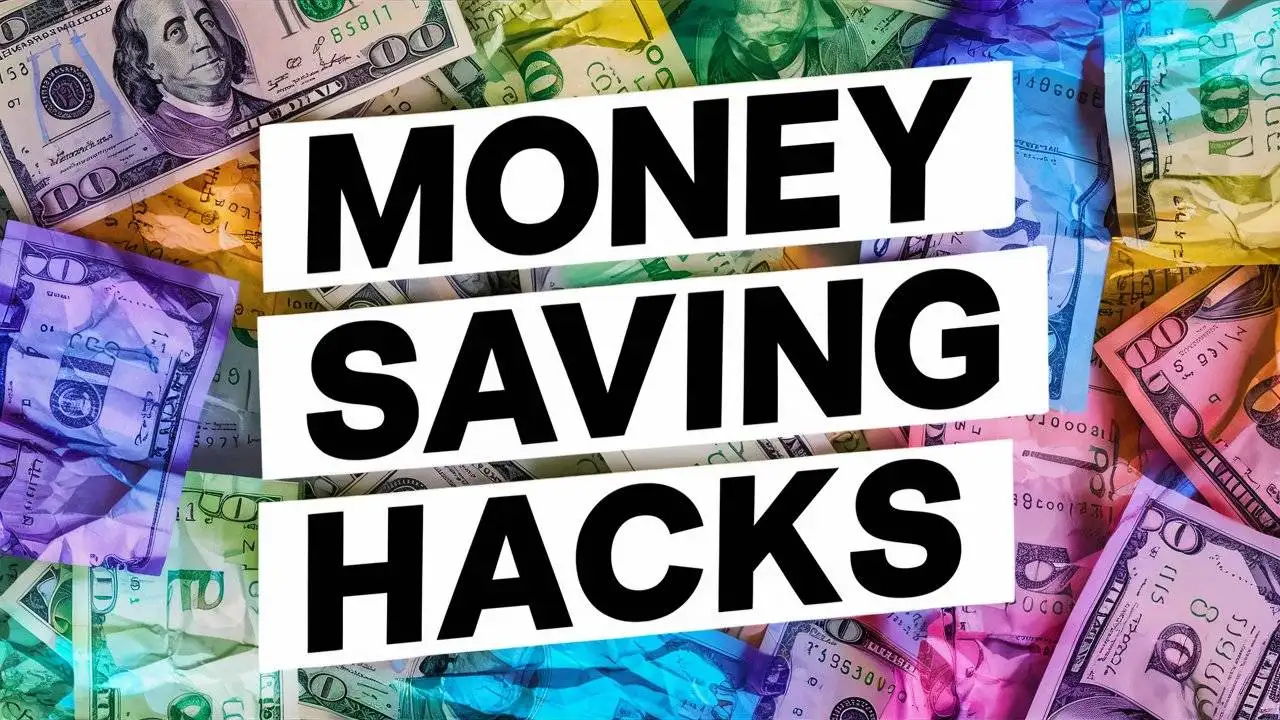
Do you find yourself overspending or using money you don’t have? Trust me, you’re not alone.
According to The Motley Fool, 79% of Americans have trouble sticking to their budgets, and the average person overspends by $20 each day. That adds up to a whopping $7,500 a year! If you’re guilty of overspending, don’t worry — I’ve been there too. In fact, I used to be someone who always had that urge to buy something new, whether it was a makeup product, new clothes, or shoes. You know what they say about “retail therapy,” right?
But here’s the good news: You can turn things around. I’ve put together 21 money-saving hacks that will help you get control of your spending and start saving money.
21 Money-Saving Hacks for the Big Spender

How to Be Smarter with Your Money: Advanced Tips for Saving and Budgeting
Saving money and sticking to a budget can feel like a constant struggle, but with the right strategies, it’s possible to take control of your finances and build a solid savings habit. From thoughtful spending to smart saving techniques, here are some advanced tips to help you manage your money effectively and reduce unnecessary expenses.
Think About the Time It Takes to Work for an Item

Before making a purchase, take a moment to consider how much time you’ll need to work to afford it. For example, if you make $50,000 per year and earn around $26 per hour, a $100 item would cost you more than four hours of work. Ask yourself if that item is truly worth the time you’ll spend earning money for it. Running the numbers can help you make more mindful decisions and avoid impulse purchases.
Learn How to Budget Your Money

Budgeting may not seem glamorous, but it’s the cornerstone of financial health. Without a clear budget, it’s hard to know if you can afford something or if you’re living beyond your means. A basic budget involves tracking your income, essential expenses, fun spending, and savings goals. The key to budgeting success is sticking to it—even when tempted to overspend. Having a realistic budget allows you to prioritize your spending and avoid future financial stress.
Monitor Your Spending

To truly understand where your money is going, you need to monitor your spending closely. Take note of where you’re putting your money. Are you often splurging on eating out, coffee, or shopping for non-essentials? Keep track of your daily spending habits through a tracking app or a simple spreadsheet. Identifying patterns will help you pinpoint areas where you can cut back. For example, brewing coffee at home or making lunch rather than dining out can add up to significant savings over time.
Lay Out Your Financial Goals

Clear financial goals provide direction and keep you motivated to save instead of spending impulsively. Whether you’re saving for a vacation, paying off debt, or building an emergency fund, having specific goals will make it easier to stick to your budget. Write them down, and revisit them frequently to remind yourself why saving is important. Financial goals also help you differentiate between wants and needs, ensuring that your spending aligns with your long-term objectives.
Get Into a Money-Saving Challenge

Make saving money a fun and engaging activity by participating in a money-saving challenge. These challenges can help you build a habit of saving without feeling deprived. Some popular challenges include:
- The 52-Week Savings Challenge: Save a specific amount each week (starting small and increasing as the year progresses).
- No-Spend Challenge: Set a goal to avoid spending on non-essentials for a week or month.
- Spare Change Challenge: Save every penny or coin you come across and deposit it in a jar or account.
Completing one challenge will motivate you to take on the next one and help you build a sustainable savings habit.
Save Money on Autopilot
If saving money feels like an uphill battle, consider automating the process. Set up automatic transfers from your checking to your savings account, so the money gets saved without you even having to think about it. You can have a set amount transferred each week or month. By automating savings, you remove the temptation to spend that money elsewhere, making it easier to reach your financial goals.
Never Go Shopping Without a List
When you go shopping without a clear list, it’s easy to get distracted by items you don’t need. Create a shopping list before heading to the store and stick to it. This simple strategy can significantly reduce impulse purchases. Stores are designed to entice you into buying more than you intended, so a list keeps you focused and helps prevent you from overspending. Additionally, limit your time in-store to minimize the risk of being tempted by items that aren’t on your list.
Ditch the Cards and Use Cash Instead
Credit cards can make it too easy to spend money you don’t have, leading to debt. Try using cash instead for discretionary spending. When you use cash, you are physically aware of how much money you have left, making you more mindful of your purchases. This method helps you stick to your budget and ensures that you don’t overspend.
Get an Accountability Partner

Saving money can feel lonely or overwhelming, but having an accountability partner can make the process easier. This could be a friend, family member, or even a financial advisor who helps keep you on track. Share your financial goals with them and ask them to check in on your progress. Regularly discussing your goals will encourage you to stick to your savings plan and avoid spending temptations.
Spend on What You Value Most
The key to mindful spending is prioritizing what truly brings you joy and satisfaction. Spend money on things that align with your values and personal happiness. For example, if travel is important to you, make room in your budget for vacations, but balance this with more economical choices in other areas, like dining out or entertainment. By focusing on what makes you happiest, you’ll feel less compelled to spend on fleeting or unnecessary items that don’t bring long-term satisfaction.
Don’t Spend Money You Don’t Have
This is a simple but crucial principle: don’t spend money you don’t have. If you don’t have the cash for something, avoid using credit cards or loans to make the purchase. This habit helps prevent you from accumulating debt and keeps your finances healthier. If an item is truly important to you, save up for it, rather than buying it on credit.
Find Cheaper Alternatives

You don’t always have to opt for the most expensive options. For example, instead of subscribing to pricey cable packages, switch to more affordable streaming services like Netflix or Hulu. Instead of dining out frequently, cook at home or consider meal prepping for the week. When traveling, look for budget accommodations like Airbnb or affordable hotels. By finding cheaper alternatives, you can cut down on expenses without sacrificing too much enjoyment.
Set a Spending Allowance
A monthly spending allowance can help you stay disciplined. Allocate a specific amount of money for non-essential purchases each month. This way, you can enjoy some indulgences without going overboard. Having an allowance forces you to make thoughtful decisions about where to spend, ensuring that you don’t blow your budget on impulse buys.
Don’t Check Out Your Cart Right Away
Before completing an online purchase, leave your cart for a few days. This allows you to reflect on whether the item is really necessary and if it aligns with your financial goals. Often, after a few days, you may find that the item is not as urgent as you initially thought. Giving yourself time to reconsider will help you avoid impulsive spending.
Stay Away from People Who Overspend
The people you surround yourself with can significantly impact your spending habits. If you associate with individuals who are always overspending, it can be difficult to maintain your own financial discipline. Surround yourself with people who value saving money and are conscious about their financial goals. Their habits may rub off on you, helping you stay on track.
Borrow Instead of Buy

Before making a purchase, ask yourself if you can borrow the item instead. For example, you can borrow tools, baby gear, or even clothes from friends or family members rather than buying new. Borrowing not only saves you money but also reduces clutter, making it a smart and sustainable choice.
Set Aside Some Money to Blow
While budgeting and saving are essential, it’s also important to allow yourself some guilt-free spending. Set aside a portion of your monthly budget for fun expenses, such as eating out, entertainment, or a spa day. This way, you can enjoy life and treat yourself without feeling guilty, knowing you’ve already planned for it in your budget.
Set a Spending Freeze
A spending freeze is a great way to gain control of your finances and reset your spending habits. For a set period—whether it’s a week, a month, or longer—commit to not spending on anything outside of necessities. This challenge will help you become more aware of your spending patterns and save money, while also forcing you to evaluate your wants versus needs.
Invest in Education Instead of Material Things
Rather than spending money on material possessions, consider investing in education and skills development. Whether it’s a course to improve your career prospects or learning something new for personal growth, education pays dividends in the long run. Skills learned today can lead to better job opportunities or the chance to start a profitable side hustle.
Be Happy with What You Have

Sometimes, we overspend because we associate happiness with owning more stuff. However, true happiness often comes from appreciating what you already have. Focusing on gratitude and contentment will reduce the desire to constantly buy new things. Being mindful of your current possessions and enjoying life’s simple pleasures can help curb unnecessary spending.
By implementing these advanced strategies for saving and budgeting, you’ll not only build better financial habits but also enjoy more control over your money. These tactics will help you make smarter decisions, stay on track with your financial goals, and create a more secure future for yourself. With discipline and consistency, you can avoid overspending and enjoy greater financial freedom.
Ready to Use These Money-Saving Hacks?

I know it can be tough to break the habit of overspending, but taking small steps each day can make a big difference. Slowly incorporating these hacks into your life will help you start saving instead of spending.
Do you have any money-saving tips or hacks to share? Let me know in the comments!
More Money-Saving Tips:
- Use Ibotta for cash back on groceries. Earn money every time you buy your essentials like bread, milk, or toilet paper. I’ve earned over $1,000 through the app — you can sign up here for a $20 bonus after your first receipt!
- Use Rakuten for online shopping. Get cash back on your purchases from over 2,500 stores. They even give you a $10 bonus for your first $25 purchase — sign up here.
- Check out the $5 Meal Plan to save on groceries. For just $5 a month, you’ll get meal plans that cost only $2 per person or $5 per family! It’s a great way to save money while still eating delicious meals.
FAQs About Money-Saving Hacks for Big Spenders
- What are some easy ways to start saving money?
- To start saving money, you can begin by setting a budget and tracking your spending. Monitor your daily expenses using a simple app or spreadsheet to spot areas where you can cut back. Also, try planning your meals and avoiding impulse purchases by sticking to a shopping list.
- How can I avoid overspending on impulse buys?
- One effective way to avoid impulse buys is to never shop without a list. Creating a shopping list before heading out helps you focus on essential items. Additionally, consider leaving your credit cards at home and using cash instead, which helps you stick to your budget more easily.
- What are some advanced strategies for budgeting and saving money?
- Advanced strategies include:
- Setting financial goals and tracking your progress.
- Participating in money-saving challenges (e.g., the 52-week savings challenge).
- Automating your savings so that money is transferred directly to your savings account before you spend.
- Setting a spending freeze for a set period to reassess your financial habits and focus on your needs versus wants.
- Advanced strategies include:
- How can I make my spending more intentional?
- Before purchasing anything, ask yourself how much time you’ll need to work to afford the item. Consider if the item is worth that amount of time. Additionally, spend money on things that align with your values and focus on what truly brings you happiness, like travel or experiences.
- How does the 52-week savings challenge work?
- The 52-week savings challenge involves saving a small amount of money each week, starting with a low amount (e.g., $1 in week 1) and gradually increasing. By the end of the year, you’ll have saved a significant amount. It’s a great way to build savings while starting small and increasing over time.
- What’s a spending freeze, and how does it help with saving money?
- A spending freeze involves committing to not spending money on anything non-essential for a designated period (e.g., one month). This exercise helps reset your spending habits, differentiate between wants and needs, and helps you save money by focusing only on necessities.
- What is the best way to handle my credit card debt?
- To avoid overspending, avoid using credit cards for discretionary spending. If you have existing debt, focus on paying it off by making regular payments and cutting unnecessary expenses. Consider using the debt snowball or debt avalanche method to reduce your credit card balance over time.
- How can I reduce unnecessary expenses in my daily life?
- To reduce expenses, you can:
- Cook at home instead of eating out.
- Use public transport instead of owning multiple cars.
- Find cheaper alternatives for services like streaming or subscriptions.
- Downsize where possible, whether that’s moving to a smaller home or reducing luxury services.
- To reduce expenses, you can:
- How do I use cash to stick to my budget?
- Using cash for discretionary spending (like entertainment, dining out, etc.) helps you stay aware of your spending limits. Once the cash is gone, you stop spending. This method encourages more mindful purchasing since you can physically see how much money you have left.
- Why is it important to set a spending allowance?
- A spending allowance is a fixed amount of money allocated for non-essential purchases each month. It gives you the freedom to indulge without going overboard, making sure you have fun without blowing your budget. This tactic helps maintain a balance between enjoying yourself and saving money.
- What is the “time for money” rule when making purchases?
- The time for money rule involves considering how much time you need to work to afford an item. For example, if an item costs $100 and you make $20 an hour, it would take you 5 hours of work to afford it. Asking yourself if the purchase is worth that much time can help you make more mindful spending decisions.
- How do I keep track of my financial progress?
- Use budgeting apps like Mint, YNAB (You Need a Budget), or a simple spreadsheet to track your expenses and savings goals. Regularly review your financial situation to stay on track with your spending limits and make adjustments as needed.
- What are some money-saving apps that can help me cut back?
- Apps like Ibotta (for cashback on groceries), Rakuten (for cashback on online shopping), and Trim (to negotiate lower bills) can help you save money on everyday purchases. These tools can help you maximize savings on things you’re already spending money on.
- How can I ensure I don’t fall back into old spending habits?
- Keeping yourself accountable is key to breaking old spending habits. Consider finding an accountability partner to check in on your progress regularly. This could be a friend or family member who encourages you to stick to your goals and offers support when needed.
- Can I save money by reducing my cable bill?
- Yes! Instead of paying for expensive cable subscriptions, consider switching to more affordable streaming services like Netflix, Hulu, or Amazon Prime Video. If you’re a sports fan, look for affordable sports streaming options, or take advantage of free content available online.
Final Thoughts
Saving money and reducing expenses doesn’t have to be overwhelming. By adopting these 21 money-saving hacks and making small, consistent changes to your spending habits, you can build a solid financial foundation and start saving for the future. Whether it’s cooking more meals at home, cutting unnecessary subscriptions, or setting a clear budget, every little bit counts. Stay committed, and you’ll be surprised at how much you can save!



